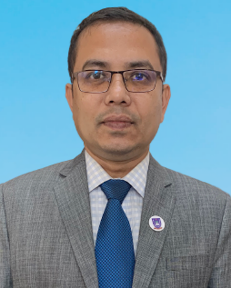
ALUMNI STORIES:Talukder Md. Raihan
Name of United Graduate School of Agricultural Sciences:Tottori University
Assigned university:Shimane university
Specialized field:Controlled Environment Agriculture/ Environmental Pollution and Control
Research theme:
・Autotoxicity in crop plant and means to overcome
・Production of specialty crops in hydroponics system under controlled/modified environment
・Agricultural pollutions and their causes, effects and solutions
Obtained (planned) degree/date:Doctor of Philosophy (Ph. D in Bioproduction Science)
Message
I am Talukder Md. Raihan and native of Bangladesh. My academic qualification includes a Master of Science degree in Agriculture and Forestry from Shimane University, Japan and Ph. D in Bioproduction Science from Tottori University, Japan. Currently, I am working as an Associate Professor at the department of Environmental Science of Bangabandhu Sheikh Mujibur Rahman Agricultural University, Bangladesh. My research focuses on the development and modification of hydroponics techniques for different crops. This is a technology for growing plants in nutrient solution (water and fertilizers) with or without the use of an artificial medium (e.g. sand, gravel, perlite, vermiculite, rock-wool, peat moss, coir, sawdust) to provide mechanical support. This soilless technique provides nutrient and water to plant with equal and higher yield compared to soil. The progress of hydroponics has been rapid and results obtained in various countries have proved that this technology is thoroughly practical and has very definite advantages over conventional methods of crop production.
Now I am paying my attention on the production of high value crops through hydroponics system. Recently, my team is conducting research on the development of specialty dietary components through hydroponic production of vegetables for providing human health benefits. We are assessing the feasibility of different hydroponics methods in Bangladesh condition and their impacts in the nutritional status of fresh vegetables and particularly in their levels of bioactive compounds.
Another aspect of my research is autotoxicity, a phenomenon of intraspecific allelopathy. Plants synthesize, store, and exude various kinds of organic compounds in their surroundings as exudates, volatiles, or residues of decomposition. Some of the released compounds (allelochemicals) that inhibit the growth of the source plants called autotoxicity. The autotoxicity was found to be increased if the plants were cultivated consecutively for years on the same land or grown by hydroponic culture without renewal of nutrient solution. Currently, we are studying autotoxicity and its effect on vegetables crops grown in hydroponics system and development of suitable control measures to overcome it.
I am also interested in agricultural pollution that causes the degradation of ecosystem, land, and environment and/or cause injury to humans and their economic interests. Study on the causes, effects and managements practices of agricultural pollutions is another dimension of my research.
Being a professional academician of Environmental Science, I offer different courses such as Fundamentals of Environmental Science, Agro-meteorology, Environmental Hazards and Disaster Management, Biodiversity Conservation, Environmental Impact Assessment and Regulations etc. for both undergraduate and post-graduate students. I have participated in many trainings, workshops and conferences in home and abroad and published many original research and review articles in several reputed journals.
Qualification: Academician, Researcher and Environmental Scientist.
Laboratory/office homepage: http://bsmrau.edu.bd/raihan/
Main published papers
- Molla A. H., Islam M. J., Mosharaf M. K., Sultana S., Talukder M. R, Miah, M. 2022. Extracellular Enzymes Production and Non-phytopathogenic Potential Fungi Isolation for the Purpose of Solid Waste Management of Safe Food Production. Waste Biomass Valor., 13(1), 369-381. URL: https://link.springer.com/content/pdf/10.1007/s12649-021-01531-w.pdf
- Razzak M. A., Talukder M. R., Asaduzzaman M., Tanaka H., Asao T. 2021. Appropriate strategies of electrodegradation for the alleviation of growth retardation during autotoxicity of lettuce in recycled hydroponics. New Zealand J. Crop Hortic. Sci., 1-18. URL: https://www.tandfonline.com/doi/abs/10.1080/01140671.2021.1944884
- Talukder M. R., Asaduzzaman M., Ueno M., Tanaka H., Asao T. 2020. Alleviation of allelochemical stress induced growth inhibition and oxidative damage in lettuce under closed hydroponics through electro-degradation. Hort. Sci. (Prague), 47: 53–68. URL: https://www.agriculturejournals.cz/web/hortsci.htm?type=article&id=32_2019-HORTSCI
- Talukder M. R., Asaduzzaman M., Tanaka H., Asao T. 2019. Application of alternating current electro-degradation improves retarded growth and quality in lettuce under autotoxicity in successive cultivation. Sci. Hortic., 252: 324-331. URL: https://www.sciencedirect.com/science/article/abs/pii/S0304423819302481
- Talukder M. R., Sarkar A., Rashid M. H. 2019. The role of arbuscular mycorrhizal fungi in the bio-protection of ash gourd (Benincasa hispida) against damping off disease. Fundam. Appl. Agric., 4(1): 704–712. URL: http://www.f2ffoundation.org/faa/index.php/home/article/view/211
- Talukder M. R., Asaduzzaman M., Tanaka H., Asao, T. 2019. Electro-degradation of culture solution improves growth, yield and quality of strawberry plants grown in closed hydroponics. Sci. Hortic., 243: 243-251. URL: https://www.sciencedirect.com/science/article/abs/pii/S0304423818305764
- Mosharaf M. K., Tanvir M. Z. H., Haque M. A., Khan M. A. A., Molla A. H., Alam M. Z., Talukder M. R. 2018. Metal-adapted bacteria isolated from wastewaters produce Biofilms by expressing proteinaceous curli fimbriae and cellulose nanofibers. Front. Microbiol., 9:1334. URL: https://www.frontiersin.org/articles/10.3389/fmicb.2018.01334/full
- Talukder M. R., Asaduzzaman M., Tanaka H., Asao T. 2018. Recovery of Autotoxicity in Lettuce by Electro-degradation. Proceeding of the Japanese Society for Horticultural Science. Vol. 17 no. 2, p. 500. 23 September 2018. Meiji University, Kagoshima, Japan.
- Asaduzzaman M., Talukder M. R., Tanaka H., Ueno M., Kawaguchi M., Yano S., Ban T., Asao T. 2018. Production of low-potassium content melon through hydroponic nutrient management using perlite substrate. Front. Plant Sci., 9:1382. URL: https://www.frontiersin.org/articles/10.3389/fpls.2018.01382/full
- Talukder M. R., Asaduzzaman M., Tanaka H., Asao T. 2018. Light-emitting diodes and exogenous amino acids application improve growth and yield of strawberry plants cultivated in recycled hydroponics. Sci. Hortic., 239: 93-103. URL: https://www.sciencedirect.com/science/article/abs/pii/S0304423818303674
- Talukder M. R., Asaduzzaman M., Ueno M., Kawaguchi M., Yano S., Ban T., Tanaka H., Asao, T. 2016. Low potassium content vegetables research for chronic kidney disease patients in Japan. Nephrol Open J., 2016; 2(1): 1-8. URL: http://dx.doi.org/10.17140/NPOJ-2-111
- Talukder M. R., Yasunaga A., Asaduzzaman M., Tanaka H., Asao T. 2016. “Autotoxicity recovery in strawberry by different LED light power and Glutamic acid application under heat stress condition” published in the Proc. The Japanese Society for Horticultural Science. Vol. 15 no. 2, p. 344. 11 September 2016. Nagoa, Japan.
- Noor S., Talukder M. R., Bhuiyan M. K. R., Islam M. M., Haque M. A., Akhter S. 2015. Development of Fertilizer Recommendation for Aquatic Taro (Colocasia esculenta) in Grey Terrace Soil. Pertanika J. Trop. Agric. Sci., 38 (1): 1 – 10. URL: http://www.agris.upm.edu.my:8080/dspace/handle/0/9875
- Tanaka H., Kosuga H., Hirose Y., Talukder M. R., Asaduzzaman M., Kuwamoto Y., Asao T. 2016. “Effect of titanium dioxide/zeolite on rooting of cutting in cherry blossom” published in the Proc. The Japanese Society for Horticultural Science. Vol. 15 no. 2, p. 450.11 September 2016. Nagoa, Japan.
